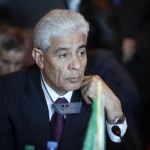In Key Defection, Libyan Minister Resigns His Post

MIDDLE EAST NEWSMARCH 31, 2011
In Key Defection, Libyan Minister Resigns His Post
By DAVID GAUTHIER-VILLARS, ALISTAIR MACDONALD and MARGARET COKER
In a major diplomatic setback to Col. Moammar Gadhafi, Libya’s foreign minister Moussa Koussa resigned from his position and may announce his defection as early as Thursday, European government officials said.
A British Foreign and Commonwealth office spokesman said. Mr. Koussa arrived in England from Tunisia Wednesday where he resigned his position as Libyan Foreign Minister,
Reuters
Libyan Foreign Minister Moussa Koussa in 2010.
“He travelled here under his own free will,” the spokesman said.
The U.K. is currently in discussions with Mr. Koussa, the spokesman said, declining to offer further comment.
Mr. Koussa’s resignation marks the highest level departure among Col. Gadhafi’s top officials since the uprising began, and will provide a boost to coalition members that are assessing different strategies in Libya.
Mr. Koussa negotiated his exit from Libya in Tunisia, where he met with French diplomats earlier this week, one European government official said.
“This is a significant blow for the regime, which looks as if it is crumbling from within,” said one British official.
U.S. officials said Mr. Koussa’s move was an example of growing splits inside Col. Gadhafi’s inner circles. In recent days, Mr. Koussa and other senior Libyan officials have reached out to at least 12 countries to discuss either defections or ways to end the Libyan conflict, according to these officials. There’s hope inside the Obama administration that a larger rebellion could take place as these senior officials leave.
“This is a very significant defection and an indication that people around Gadhafi think the writing’s on the wall,” said a senior U.S. official.
Mr. Koussa, thought to be in his late 50s, was Col. Gadhafi’s spy chief for approximately two decades, a period of time when Libya was suspected to be behind a string of terrorist attacks in Europe that killed Libyan dissidents and foreigners.
Libyan government spokesman Moussa Ibrahim, told The Wall Street Journal Mr. Koussa “was on a diplomatic mission.”
Associated Press
Mr. Koussa in Tripoli last week.
Mr. Ibrahim said if Mr. Koussa’s diplomatic mission requires him to go to London or anywhere else then he’ll do so. He refused to answer any more questions saying he had “a headache.”
Some Libyan opposition leaders believe that Mr. Koussa had a hand in organizing the Pan Am Flight 103 bombing in 1988, although he has never been indicted for that attack.
Mr. Koussa, who took over as foreign minister in March 2009, appears to have been a key participant in Libya’s decision to abandon its weapons of mass destruction programs, which led to the lifting of international sanctions against his homeland, according to diplomats.
He played a key role in reaching deals to compensate the victims of the 1988 Lockerbie bombing and the bombing of a French airliner the following year, removing one of the biggest obstacles to normalize relations with the West.
Two years ago Mr. Koussa participated in negotiations with Britain over the release of Abdel Basset Al-Megrahi, the man convicted of the Lockerbie bombing.
For the last several weeks in Tripoli, Mr. Koussa had been one of the main spokesmen briefing foreign journalists about the conflict in Libya. He had referred to the rebel leaders in Benghazi as criminals and al Qaeda supporters.
Mr. Koussa’s last public appearance was on March 19, the day allied forces first launched airstrikes against Col. Gadhafi’s military targets.
That day he read to reporters in Tripoli a terse statement reaffirming a ceasefire that was hardly being observed by Col. Gadhafi’s forces on the ground.
Earlier this month, the U.S Treasury Department froze the assets of Mr. Koussa in accordance with the U.N. sanctions imposed on the Libyan regime.
The U.S. Treasury also prohibited U.S. citizens from doing business with him and 16 Libyan companies in the aviation, banking, investment and oil sectors which are believed to have ties to Mr. Koussa and other regime members.
—Sam Dagher in Tripoli and Jay Solomon in Washington contributed to this article.
Write to David Gauthier-Villars at David.Gauthier-Villars@wsj.com, Alistair MacDonald at alistair.macdonald@wsj.com and Margaret Coker at margaret.coker@wsj.com